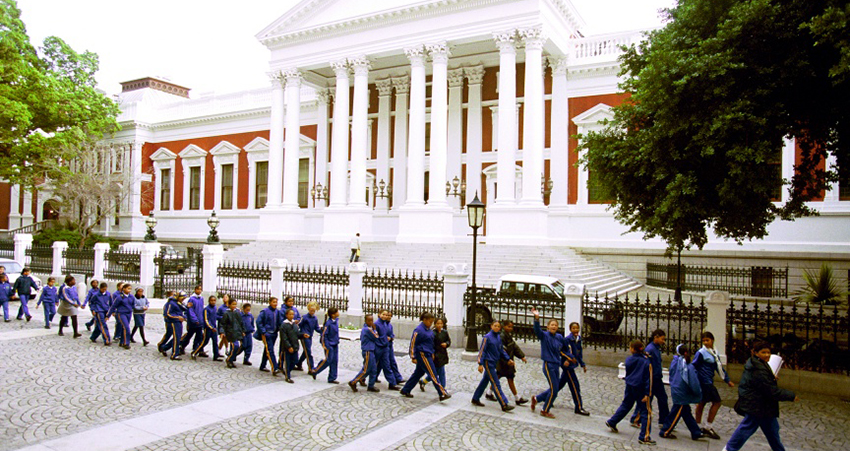Stock-based versus flow-based redistribution (Zimbabwe and South Africa)

The outside of Parliament in South Africa (Source: World Bank/Trevor Samson)
Focus of the study
Our key research question is: How can a political and economic equilibrium be changed so that the economy embarks on a new development path that is not derailed irrespective of who governs?
This question is important for all countries where unequal wealth and income generate unequal power — and in particular for developing countries. It is relevant for both those who want and those who don’t want more equality.
We aim at modelling a political and economic equilibrium where inequality is a catch all word for a wide range of economic and political disparities. Our model can be described as this:
- (A) The initial inequality affects individual and organizational behavior, including the selection of preferences of those who govern and the possibility to implement different policies towards those who are governed.
- (B) The selected policies and behaviors affect the outcome and the social and economic inequality which form the initial conditions (A’) for a new round of political and economic behavior.
- The dynamics of the system loosely described by (A) – (B) – (A’) can clearly be path dependent.
While a high level of inequality can generate policies that induce or sustain inequality, a more egalitarian starting point can sustain policies that maintain the low inequality.
Our model allows us to distinguish between assets and income, and thus between the redistribution of wealth and earnings. Our perspective suggests that to change the political and economic equilibrium and to induce a new development path one has to change many factors simultaneously. The sustainability of the path depends on the specific details of the political and economic system in addition to the general distribution of initial endowments.
Broader motivation for the research
Those who want more equality may ask: What works best? To redistribute the in-egalitarian outcomes of unequal wealth, or to redistribute wealth in a egalitarian way? Similar considerations – but with the opposite objective – may apply for those who want to preserve the present inequality and power. What kind of seemingly sensible and needed reforms are least likely to alter the present distribution of power and pay?
The project aims at exploring how both sides may try to apply changes in the distribution of assets and income strategically to achieve their long term goals. We are particularly interested in how the defenders of status quo and an egalitarian opposition may use distributional policies to achieve their objectives in countries like Zimbabwe and South Africa.
Research team
- Karl Moene (Principal Investigator)
- Rob Davies, Zimbabwe (and South Africa)
- Halvor Mehlum, Norway
- Ragnar Torvik, Norway




